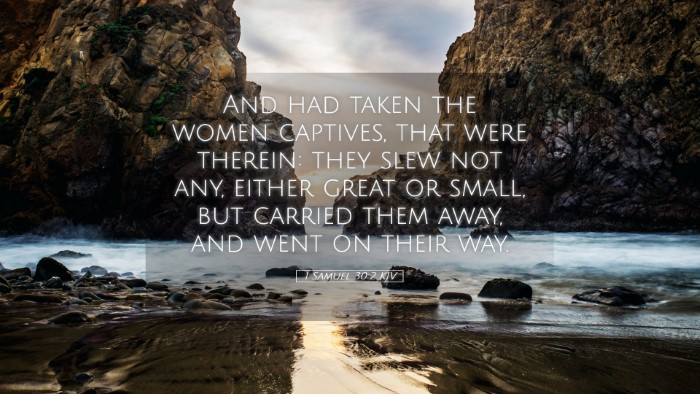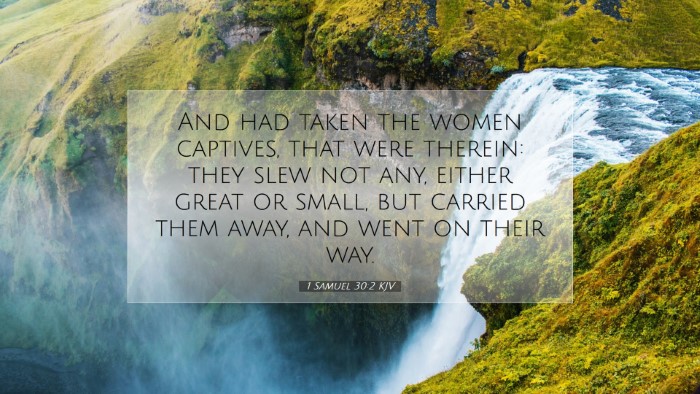Commentary on 1 Samuel 30:2
Verse Text: "And had taken the women captive, that were therein: they slew not any, either great or small, but carried them away, and went on their way."
Introduction
The verse in question provides a crucial insight into the events surrounding David during a vulnerable period of his life. Captivity and loss are central themes in this narrative, illustrating profound lessons about faith, despair, and retribution.
Contextual Background
Before diving into detailed commentary, it's essential to consider the context of 1 Samuel. David, having fled from Saul, is living among the Philistines in Ziklag. At this point, David and his men return home to find their city burned and their families taken captive.
Public Domain Insights
Matthew Henry's Commentary
Henry emphasizes the calamity that befalls David and his men. The emotional toll of the losses resonates through the text, symbolizing the trials that leaders often face. He notes:
- The Suddenness of Loss: The attack occurred while the men were away, highlighting a common human experience—the suddenness of tragedy.
- God's Providence: Henry suggests that God allowed this devastation to prepare David for his future role as king, underscoring a providential view of hardships.
Albert Barnes' Notes
Barnes focuses on the actions of the Amalekites, who represent a formidable enemy. He discusses:
- The Captivity of Women and Children: The Amalekites did not kill the captives, indicating their intention to use them as leverage, which Barnes interprets as a tactical decision that reflects a brutal reality of warfare.
- The Moral Implications: Barnes posits that the taking of captives, while brutal, highlights the harsh realities of conflict and the struggle between good and evil.
Adam Clarke's Commentary
Clarke delves deeper into the implications of this event for David’s leadership. He remarks:
- The Reaction of David: Clarke points out that the emotional turmoil of losing their families drove David and his men to despair, yet emphasizes the necessity of turning to God in times of grief.
- The Significance of Captivity: Clarke elaborates on the idea that captivity is not just a physical condition but a spiritual and emotional state, which can also apply to modern struggles.
Theological Themes
This verse encapsulates several theological themes relevant for pastors, students, and theologians:
- The Nature of Suffering: The devastation experienced by David and his men reflects the broader human experience of suffering and loss.
- Divine Providence: The passage reminds believers that even in despair, God is orchestrating events towards a greater purpose.
- The Leadership Crisis: It highlights how leaders respond in crises and lays the groundwork for David’s development as a leader.
Application for Modern Believers
Reflecting on 1 Samuel 30:2, modern believers can draw valuable lessons:
- Facing Loss: The reality of losing loved ones or facing unexpected trials is a part of life; how we respond is crucial.
- Seeking God in Distress: When faced with overwhelming challenges, turning to prayer and seeking divine guidance is vital.
- Resilience of Faith: David's journey shows the importance of resilience in faith, encouraging believers to stand firm despite adversity.
Conclusion
1 Samuel 30:2 serves as a poignant reminder of the complexities of leadership, the brutality of conflict, and the ever-present hope found in reliance on God. By understanding past struggles, contemporary readers can find encouragement and strength in their own spiritual journeys.


